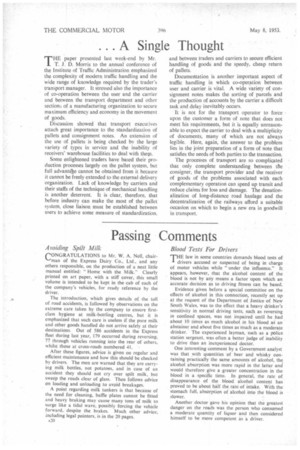...A Single Thought
Page 22

If you've noticed an error in this article please click here to report it so we can fix it.
THE paper presented last week-end by Mr. T. J. D. Morris to the annual conference of the Institute of Traffic Administration emphasized the complexity of modern traffic handling and the wide range of knowledge required by the trader's transport manager. It stressed also the importance of co-operation between the user and the carrier and between the transport department and other sections of a manufacturing organization to secure maximum efficiency and economy in the movement of goods.
Discussion showed that transport executives attach great importance to the standardization of pallets and consignment notes. An extension of the use of pallets is being checked by the large variety of types in service and the inability of receivers' warehouse facilities to deal with them.
Some enlightened traders have based their production processes largely on the pallet system, but full advantale cannot be obtained from it because it cannot be freely extended to the external delivery organization. Lack of knowledge by carriers and their staffs of the technique of mechanical handling is another deterrent. It is clear, therefore, that before industry can make the most of the pallet system, close liaison must be established between users to achieve some measure of standardization, and between traders and carriers to secure efficient handling of goods and the speedy, cheap return of pallets.
Documentation is another important aspect of traffic handling in which co-operation between user and carrier is vital. A wide variety of consignment notes makes the sorting of parcels and the production of accounts by the carrier a difficult task and delay inevitably occurs.
It is not for the transport operator to force upon the customer a form of note that does not meet his requirements, but it is equally unreasonable to expect the carrier to deal with a multiplicity of documents, many of which are not always legible. Here, again, the answer to the problem lies in the joint preparation of a form of note that satisfies the needs of both parties to the transaction.
The processes of transport are so complicated that only complete understanding between the consigner, the transport provider and the receiver of goods of the problems associated with each complementary operation can speed up transit and reduce claims for loss and damage. The denationalization of long-distance road haulage and the decentralization of the railways afford a suitable occasion on which to begin a new era in goodwill in transport.












































































